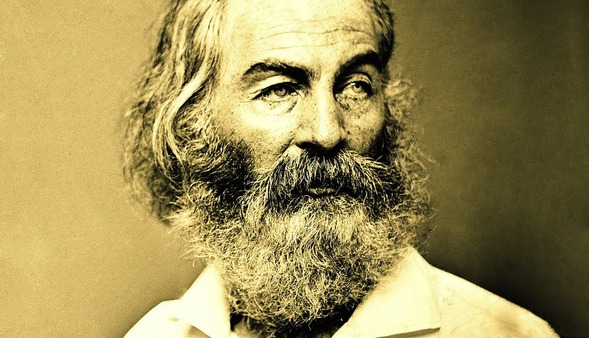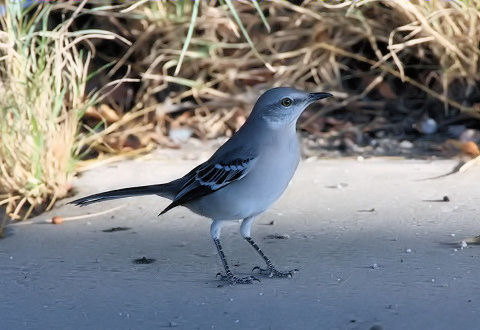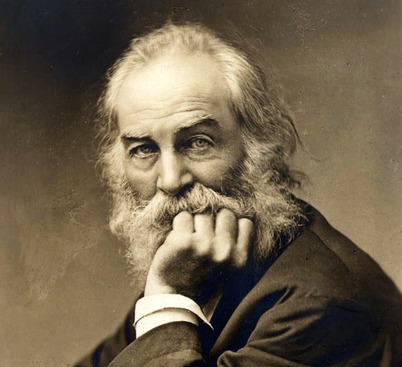To my mind, the crucial part of the poem is condensed in the following lines:
The colloquy there, the trio, each uttering,
The undertone, the savage old mother incessantly crying,
To the boy's soul's questions sullenly timing, some drown'd secret hissing,
To the outsetting bard.
The primary meaning of the trio is the bird, the speaker, and the sea, but there are many ways to develop and expand that reading.
I don't jump right into that though; rather, I start at the beginning of the poem with that first stanza, filled with so many prepositional phrases strung together that it's easy to miss that it is in fact a single sentence.
Out of the cradle endlessly rocking,
Out of the mocking-bird's throat, the musical shuttle,
Out of the Ninth-month midnight,
Over the sterile sands and the fields beyond, where the child
leaving his bed wander'd alone, bareheaded, barefoot,
Down from the shower'd halo,
Up from the mystic play of shadows twining and twisting as if they
were alive,
Out from the patches of briers and blackberries,
From the memories of the bird that chanted to me,
From your memories sad brother, from the fitful risings and fallings I heard,
From under that yellow half-moon late-risen and swollen as if with tears,
From those beginning notes of yearning and love there in the mist,
From the thousand responses of my heart never to cease,
From the myriad thence-arous'd words,
From the word stronger and more delicious than any,
From such as now they start the scene revisiting,
As a flock, twittering, rising, or overhead passing,
Borne hither, ere all eludes me, hurriedly,
A man, yet by these tears a little boy again,
Throwing myself on the sand, confronting the waves,
I, chanter of pains and joys, uniter of here and hereafter,
Taking all hints to use them, but swiftly leaping beyond them,
A reminiscence sing.
We use this discovery then to think about how important memory is in this poem, and what it would mean for the speaker to go back to being a little boy again as he claims to do. Where in time are we to locate the speaking voice of this poem? What kind of temporality are we talking about?
Two feather'd guests from Alabama, two together,
And their nest, and four light-green eggs spotted with brown,
And every day the he-bird to and fro near at hand,
And every day the she-bird crouch'd on her nest, silent, with bright eyes,
And every day I, a curious boy, never too close, never disturbing
them,
Cautiously peering, absorbing, translating.
We then compare that song to the song mentioned at the end of the poem, when the speaker asks for as a "word final, superior to all."
Whereto answering, the sea,
Delaying not, hurrying not,
Whisper'd me through the night, and very plainly before daybreak,
Lisp'd to me the low and delicious word death,
And again death, death, death, death
Hissing melodious, neither like the bird nor like my arous'd child's heart,
But edging near as privately for me rustling at my feet,
Creeping thence steadily up to my ears and laving me softly all over,
Death, death, death, death, death.
From here everything falls into place, and we can expand our discussion more meaningfully. We compare the song of the bird to the song of the sea, and then we expand to consider the song of the speaker.
We also return to the concept of time. What does it mean that the sea is associated with both birth (the cradle) and death, and how is the bird counterpoised against that? Are the bird and the sea opposites, with one representing a heroic refusal to give up on life and hope and the other offering a seductive call to surrender to destiny or to death? Are the bird and the sea two sides of the same coin, since both are associated with life and with death?
And, finally, how does the speaker fit into all of this?
Demon or bird! (said the boy's soul,)
Is it indeed toward your mate you sing? or is it really to me?
For I, that was a child, my tongue's use sleeping, now I have heard you,
Now in a moment I know what I am for, I awake,
And already a thousand singers, a thousand songs, clearer, louder
and more sorrowful than yours,
A thousand warbling echoes have started to life within me, never to die.
O you singer solitary, singing by yourself, projecting me,
O solitary me listening, never more shall I cease perpetuating you,
Never more shall I escape, never more the reverberations,
Never more the cries of unsatisfied love be absent from me,
Never again leave me to be the peaceful child I was before what
there in the night,
By the sea under the yellow and sagging moon,
The messenger there arous'd, the fire, the sweet hell within,
The unknown want, the destiny of me.
It is somewhere around this point that students start to see that the speaker is complaining that the mourning bird's aria has awakened him out of the blissful peace of his childhood and that he will never be the same again. The poem comes to us in the voice of an adult man, who looks back at the moment of his childhood when he suddenly started to understand the concepts of love and loss, the moment when he could first project forward in time to his own eventual suffering and death. The death of the she-bird can, therefore, serve as a symbol for the death of his own childlike ignorance.
I think it worthwhile to point out to the students how much the speaker is like the "demon" bird in that he awakens in his auditors an understanding of both goodness and suffering. If he is the "bird," we are now the boy. Life may be more complicated for the speaker after his encounter with the bird, but it's not all "death, death, death, death, death." Despite the poignancy and mournfulness of the poem, the child grows up and gains his own poetic voice. I end by telling my students that I hope that they too will fly off from the course a little bit older and whole lot wiser.



 RSS Feed
RSS Feed